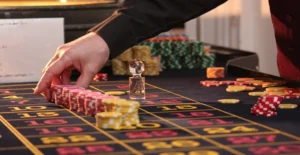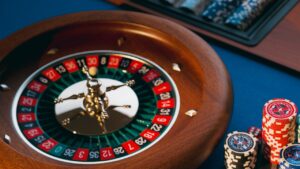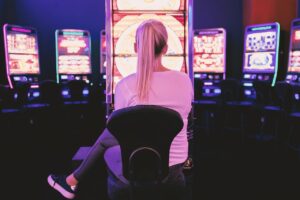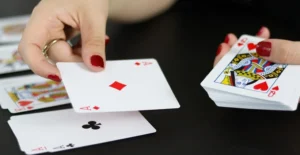Ever wondered if the person spinning the roulette wheel has some secret power over where the ball lands? It’s a common thought, especially when you see a dealer who seems to be on a roll. The idea that a dealer could control the ball, even just a little, is pretty fascinating. But is it true? Can a roulette dealer control the ball, or is it all just a myth? Let’s examine the facts and see what’s happening.
Key Takeaways
- Modern roulette wheels are designed to make ball control impossible for dealers.
- Casinos use strict rules and surveillance to stop any attempts at cheating.
- The ball’s path is affected by many changing factors, making it hard to predict.
- While some dealers might have a ‘signature’ style, it doesn’t mean they can aim the ball.
- The idea of magnets or other gadgets being used to cheat is just a myth.
Can a Roulette Dealer Control the Ball?
The question of whethera roulette dealer controls where the ball lands is a long-standing debate in the gambling world. Some players swear by it, while experts largely dismiss it as a myth. Let’s explore the arguments and evidence surrounding this fascinating topic.
Some believe that dealers, through subtle manipulations of the wheel and ball, can influence the outcome. This idea suggests that experienced dealers develop a ‘signature’ or technique that allows them to target specific sections of the wheel. However, the mechanics of roulette and casino safeguards are designed to prevent such control.
The Myth of Dealer Ball Control Debunked
It’s a common idea: the roulette dealer, with years of experience, can subtly influence where the ball lands. But is it true? Let’s look at why the idea of dealer ball control is mostly a myth.
The biggest reason it’s unlikely is the sheer number of variables involved.
Think about it. The dealer has to:
- Launch the ball at a consistent speed.
- Release the ball from the same spot each time.
- Factor in the wheel’s speed.
- Account for bounces and obstacles.
That’s a lot to control all at once! It’s like trying to juggle while riding a unicycle on a bumpy road. The wheel itself has design elements to prevent predictability.Roulette wheel layouts are carefully designed to randomize the outcome.
Even if a dealer could get close to repeating their actions, tiny changes in humidity, temperature, or even the way the ball bounces can throw everything off. These small variations add up, making it nearly impossible to predict where the ball will land with any real accuracy.
Many experts agree that if dealers could control the ball, casinos would be in serious trouble. The fact that casinos continue to thrive suggests that this level of control is more fiction than reality. Some argue that the belief in dealer control is similar to believing in Bigfoot – lots of stories, but little concrete proof. Some dealers themselves have admitted that intentionally directing the ball is nearly impossible, even when trying to drop the ball into a specific number. The idea of a “dealer signature,” where unconscious habits lead to predictable results, is also debated. If obstacles on the wheel randomize results too much for intentional steering, they would also affect unconscious spins. Ultimately, the myth of dealer ball control is debunked by the complex mechanics of the game and the limitations of human precision.
How Roulette Mechanics Ensure Randomness
Roulette isn’t just about luck; it’s also about physics and engineering. The design of the wheel and the procedures used in casinos are all intended to make the game as random as possible. Let’s break down how this works.
The roulette wheel itself is designed to promote randomness. The placement of the numbers, the use of deflectors, and even the materials used all play a role.
Think about it – if the numbers were in order, it would be way easier to predict where the ball might land. The seemingly chaotic arrangement is actually carefully planned to make predictions harder. The alternating colors (red and black) also contribute to this randomness.
Casinos take randomness seriously. They don’t want dealers to be able to control the outcome, and they don’t want players to find easy patterns. That’s why they invest in sophisticated equipment and procedures.
Here’s a look at some of the key elements:
- Wheel Balance: A perfectly balanced wheel is essential. Any slight imbalance could cause the ball to land more frequently in certain sections. Casinos regularly check and adjust their wheels to maintain balance.
- Deflectors: These little obstacles on the wheel’s track are designed to bounce the ball around unpredictably as it loses momentum. They add an element of chaos that makes it harder to guess the final landing spot.
- Ball Material: The ball itself is made of a specific material (usually ivory or plastic) that is chosen for its consistent weight and roundness. This helps to ensure that the ball behaves predictably (or rather, unpredictably) each time it’s spun.
Casino procedures also play a big role. For example, dealers are often required to alternate the direction of the spin and the speed of the rotor. This prevents them from developing a consistent pattern that could be exploited. These procedures help to maintain the game’s randomness.
Here’s a simple table illustrating how the house edge remains consistent across different numbers:
| Number | European Roulette House Edge | American Roulette House Edge |
| 1-36 | -2.70 | -5.26 |
| 0 | -2.70 | -5.26 |
| 00 | N/A | -5.26 |
| ∞ | -2.70 | -5.26 |
Variables That Defeat Dealer Influence

Okay, so we’ve talked about whether dealers can control the ball, but let’s be real – even if some dealers have skills, a bunch of stuff makes it super hard to pull off consistently. It’s not like they’re robots with perfect aim every single time.
Many factors can affect the outcome of a roulette spin, making it difficult for a dealer to have complete control.
- Wheel Imperfections: Tiny bumps, dents, or uneven surfaces on the wheel can cause unpredictable bounces. It’s like trying to control a soccer ball on a bumpy field.
- Ball Condition: The ball itself isn’t always perfect. It can have slight variations in weight or shape that change how it rolls.
- Air Resistance: The air in the casino, even with climate control, isn’t perfectly still. Little drafts and changes in air pressure can affect the ball’s trajectory.
- Table Level: If the roulette table isn’t perfectly level, it can introduce a bias, making certain sections more likely to hit. Casinos try to avoid this, but it can happen.
Think about it this way: a dealer might try to aim for a certain section, but all these little things act like tiny nudges, pushing the ball slightly off course. Over time, these small changes add up, making it really tough to predict where the ball will land.
Casinos also take steps to minimize any potential influence. They regularly inspect and maintain the wheels, rotate them to prevent wear, and keep an eye out for anything that might give someone an unfair advantage. Plus, let’s not forget the psychological aspect. A dealer who’s too consistent might attract unwanted attention from the pit boss or surveillance. It’s a risky game, even if they have the skill. Some dealers may try to steer against players after periods of steering for those same players, essentially taking back the house money they had passed out.
Surveillance & Regulatory Safeguards in Casinos

Casinos aren’t just relying on luck; they have layers of protection to ensure fair play and prevent any funny business. Think of it as a high-tech, watchful eye overseeing everything. These measures are in place to protect both the casino and the players.
Casinos operate under strict regulations, and they’re constantly monitored to make sure they’re following the rules. It’s a serious business, and the consequences for cheating or allowing cheating to happen can be severe.
- Extensive Camera Coverage: Casinos are filled with cameras, recording every angle of every table. This makes it hard for anyone to cheat without getting caught.
- Trained Surveillance Staff: There are people whose job it is to watch those camera feeds, looking for anything suspicious. They know what to look for and how to spot potential problems.
- Regulatory Oversight: Gaming commissions and other regulatory bodies keep a close eye on casinos, conducting audits and investigations to ensure compliance.
The goal is to create a safe and fair environment for everyone. These safeguards are not just about catching cheaters; they’re about maintaining trust and integrity in the gaming industry.
Casinos also use technology to track betting patterns and identify potential collusion or other forms of cheating. It’s a constant game of cat and mouse, with casinos always trying to stay one step ahead. For example,Zoom Roulette uses algorithms to detect unusual betting patterns, which can help identify potential cheating or advantage play.
Dealer “Signature” vs. Intentional Steering
Okay, so let’s talk about something that gets debated a lot in roulette: the difference between a dealer’s “signature” and them intentionally trying to steer the ball. It’s not the same thing, and understanding the difference is key.
Some players swear that certain dealers have a way of spinning the ball that makes it land in a particular area more often. Is it a conscious effort, or just a quirk of their style? That’s the million-dollar question.
It’s easy to fall into the trap of thinking every dealer is trying to pull a fast one, but most of the time, it’s just randomness at play. However, the possibility of a dealer having a subtle, unconscious influence on the game is something to consider.
Think of it like a baseball pitcher. They might have a certain way of throwing that makes a curveball more likely, even if they’re not always trying for it. Is it skill, luck, or just physics? It’s hard to say for sure.
Now, intentional steering is a whole different ballgame. That’s when a dealer is actively trying to influence where the ball lands. It’s much harder to pull off, and it’s definitely against the rules. But does it happen? Some people think so. It’s like trying to control a Bitcoin gambling site – difficult, but not impossible.
Here’s a quick breakdown:
- Dealer Signature: Unconscious, subtle influence on the ball’s trajectory due to the dealer’s unique style.
- Intentional Steering: Conscious effort by the dealer to manipulate the ball’s landing.
- Randomness: The inherent unpredictability of the roulette wheel which makes consistent steering very difficult.
It’s a complex issue with no easy answers. But by understanding the difference between these concepts, you can approach the roulette table with a more informed perspective.
Can Skilled Dealers Target Wheel Sections?
The question of whether a skilled roulette dealer can intentionally influence where the ball lands is a long-standing debate. While some believe it’s possible to target specific wheel sections, others dismiss it as a myth. Let’s explore the arguments.
The idea that dealers can consistently and accurately target specific sections of the roulette wheel is highly debated.
Some players swear they’ve seen dealers exhibit a “signature” – a consistent pattern in their spin technique that favors certain areas. Others believe it’s simply confirmation bias, where players only remember the times the ball landed where they expected.
It’s important to remember that even if a dealer has a consistent style, numerous variables can affect the ball’s trajectory. These include the wheel’s condition, the ball’s speed, and even slight variations in the dealer’s release.
Here are some points to consider:
- Dealer Consistency: Can a dealer maintain a consistent spin over long periods?
- Wheel Condition: How do minor imperfections in the wheel affect predictability?
- External Factors: Do environmental conditions (temperature, humidity) play a role?
It’s also worth noting that casinos employ various countermeasures to prevent dealers from manipulating the game. These include regular wheel maintenance, surveillance, and dealer rotation. If you’re looking to improve your game, consider exploring different roulette betting strategies.
Reddit Accounts: Dealers Claim Control—Fact or Fiction?
Online forums, especially Reddit, are full of stories about roulette dealers and their supposed abilities. You’ll find everything from casual players sharing their suspicions to alleged dealers making bold claims. Sorting fact from fiction in these accounts can be tricky, but it’s worth exploring what’s being said.
Some users swear they’ve witnessed dealers influencing the ball’s trajectory, while others dismiss the idea as pure fantasy. The truth likely lies somewhere in between, with a mix of genuine observations, misinterpretations, and outright fabrications contributing to the online narrative. It’s a digital echo chamber where rumors can spread quickly, making it hard to verify any specific claim.
It’s easy to get caught up in the excitement (or frustration) of a roulette game and attribute outcomes to dealer skill (or malice). But remember, casinos are heavily regulated, and dealers are under constant surveillance. While it’s fun to speculate, always approach these online stories with a healthy dose of skepticism.
Magnet and Gadget Cheating Myths Debunked
It’s easy to get caught up in stories of elaborate cheating schemes, especially when they involve technology. When it comes to roulette, tales of magnets and hidden gadgets are common, but how much of it is true? Let’s break down some of the most persistent myths.
The idea that magnets can be used to control the ball’s landing spot is largely a myth. While theoretically possible, the practical challenges are immense. The strength of the magnet needed, the precision required, and the casino’s security measures make it incredibly difficult to pull off.
Think about it:
- The roulette ball itself isn’t typically made of a magnetic material.
- Even if it were, the magnetic field would need to be incredibly strong and precisely controlled.
- Casinos regularly inspect their equipment for tampering.
The reality is that casinos are far more concerned with simpler methods of cheating, like past posting (adding chips after the outcome is known) or collusion between players and dealers. These methods are easier to execute and harder to detect than elaborate tech-based schemes.
Another common myth involves using gadgets to predict where the ball will land. These devices supposedly analyze the wheel’s speed and the ball’s trajectory to give the player an edge. While such devices might exist, their effectiveness is questionable. Modern roulette wheels are designed to be as random as possible, and casinos employ various countermeasures to prevent electronic cheating. Plus, using such devices is illegal and carries serious consequences. It’s much more effective to learn video poker strategy than to try and cheat the system.
Historical Attempts to Beat Roulette with Tech
Over the years, people have tried all sorts of things to get an edge at roulette, and some of the most interesting attempts involve technology. It’s a classic cat-and-mouse game between players trying to find a loophole and casinos trying to stay one step ahead. Let’s look at some of the more notable examples.
Early Computer Use
Back in the day, even before personal computers were common, some folks were already thinking about how to use technology to predict where the ball would land. These early systems often involved clunky devices to measure the speed of the wheel and the ball. The idea was simple: input the data, run some calculations, and figure out which section of the wheel was most likely to win. Of course, actually pulling this off in a real casino was a whole different story.
The Infamous Doyne Farmer and the Eudaemons
One of the most famous stories involves Doyne Farmer and his group, the Eudaemons. In the 1970s, they built a wearable computer designed to predict roulette outcomes. Imagine trying to sneak that into a casino! The system involved someone tapping their toe to measure the wheel’s speed, and another person using the data to predict the winning section. It sounds like something out of a movie, but it was real. While they had some success, the technology wasn’t quite reliable enough to make them rich, and the risk of getting caught was always high. It’s a great example of how far people will go to try and beat the system.
Microcomputers and Lasers
As technology advanced, so did the attempts to beat roulette. Some people started using microcomputers and even lasers to get more accurate measurements. The idea was to precisely track the ball’s trajectory and predict its landing spot. These systems were more sophisticated than the early attempts, but they also came with their own set of challenges. Casinos got better at detecting these devices, and the penalties for getting caught became more severe. Plus, even with advanced technology, the inherent randomness of roulette made it tough to guarantee a win. Understanding casino table games is key to appreciating these attempts.
The Problem of Predictability
The biggest issue with using technology to beat roulette is that the game is designed to be unpredictable. Even with perfect measurements, tiny variations in the wheel, the ball, or even the air currents can throw off the calculations. That’s why, despite all the clever attempts over the years, no one has ever really cracked the code to consistently win at roulette using technology. It remains a game of chance, and that’s part of what makes it so appealing.
Modern-Day Apps and Software
Even today, you can find apps and software that claim to predict roulette outcomes. Most of these are scams, but they show that the desire to beat the game with technology is still alive and well. These apps often use random number generators or other tricks to make it seem like they’re working, but in reality, they’re just preying on people’s hopes and dreams. It’s important to be skeptical of any system that promises guaranteed wins at roulette, because if it sounds too good to be true, it probably is.
Here’s a quick look at how tech has been used over time:
| Era | Technology Used | Success Rate | Challenges |
| 1970s | Wearable Computers | Low | Reliability, Detection |
| 1980s-90s | Microcomputers, Lasers | Moderate | Casino Security, Randomness |
| 2000s-Now | Apps, Software | None | Mostly Scams, Inherent Game Randomness |
The allure of easy money.
- The challenge of beating the system.
- The constant evolution of technology.
The Role of Biased Wheels in Advantage Play
It’s not all about dealer skill; sometimes, the wheel itself is the problem (or the opportunity, depending on your perspective). A biased wheel is one that, due to manufacturing defects or wear and tear, favors certain numbers or sections over others. This isn’t some conspiracy theory; it’s a real thing that advantage players look for. Exploiting these biases can shift the odds in your favor.
Think of it like this: if a wheel consistently lands on red more often than black, betting on red becomes a smart move. But finding these biases? That’s the tricky part.
- Careful observation is key.
- Tracking results over many spins is necessary.
- Statistical analysis helps reveal patterns.
It’s important to remember that casinos aren’t stupid. They regularly inspect and rotate their wheels to minimize any potential bias. So, finding a wheel with a significant, exploitable bias is like finding a needle in a haystack. But for those dedicated to advantage play, it’s a needle worth searching for.
Advantage players need to understand how to identify and exploit roulette wheel bias.
Casino Countermeasures: Wheel Design & Rotation
Casinos aren’t just sitting ducks when it comes to advantage players. They actively work to make roulette as random as possible. Two key strategies are wheel design and rotation. Let’s take a look at how these work.
Wheel Design for Randomness
Modern roulette wheels are engineered to minimize predictability. The deflectors, those little obstacles on the wheel’s track, are a big part of this. They bounce the ball around unpredictably as it loses momentum. The pocket depth and arrangement also play a role in preventing the ball from consistently landing in the same area. It’s all about creating as much variance as possible.
Regular Wheel Rotation
Casinos don’t just leave the same wheel in the same spot forever. They rotate them. This is done to prevent any single wheel from developing a predictable bias due to wear and tear. Think about it: a tiny imperfection might cause the ball to favor one section over time. Rotation helps to even things out. This is a simple but effective way to combat card roulette strategies that rely on wheel bias.
Dealer Procedures
Casinos also have rules for dealers to follow that are designed to increase randomness. These might include:
- Alternating the direction of the ball’s spin.
- Varying the speed of the rotor.
- Spinning the ball from different starting points.
These procedures make it harder for anyone to predict where the ball will land, even if they’re watching closely. It’s all about disrupting any potential patterns.
Casinos are very aware of the potential for bias, whether it’s from the wheel itself or from a dealer’s actions. They implement these countermeasures to protect the integrity of the game and ensure a fair experience for all players.
Frequently Asked Questions
Can a roulette dealer make the ball land where they want?
No, a roulette dealer cannot truly control where the ball lands. Modern roulette wheels have special parts and rules that make it impossible for even the most skilled dealer to aim the ball at a specific number or section. Things like the way the wheel spins, the speed of the ball, and little metal obstacles on the wheel all work together to make the outcome completely random.
Is it true that dealers can steer the roulette ball?
Many people think dealers can control the ball, but this is mostly a myth. While some old-time casinos might have used simpler wheels that allowed for some influence, today’s casino equipment and strict rules prevent any real control. It’s more about how the game is designed to be fair and unpredictable.
How does roulette stay random and fair?
Roulette wheels are built to be random. They have a spinning wheel and a ball that goes in the opposite direction. There are also tiny metal walls, called deflectors, that the ball hits as it falls, making its path unpredictable. This design ensures that every spin is independent and fair.
What makes it so hard for a dealer to control the ball?
Many things make it impossible for a dealer to influence the outcome. The ball’s speed, the wheel’s speed, and the way the ball bounces off the metal obstacles all create too much randomness. Even tiny differences in how the dealer releases the ball can lead to completely different results.
How do casinos prevent cheating by dealers?
Casinos use many ways to make sure games are fair. They have cameras everywhere watching everything, and there are strict rules that dealers must follow. Government groups also check on casinos to make sure they are playing by the rules and that no one is cheating.
What’s the difference between a dealer’s ‘signature’ and actual cheating?
A dealer’s ‘signature’ is just their natural way of spinning the ball and wheel, which might create a slight pattern over many spins. However, this is different from intentionally trying to make the ball land in a specific spot. Most experts agree that even a ‘signature’ isn’t enough to let a dealer control the game.
Can experienced dealers aim for a certain part of the wheel?
While some people believe very skilled dealers might be able to hit a general section of the wheel, this is highly unlikely with modern equipment. The randomness built into the wheel and the many variables involved make it practically impossible to consistently target specific areas.
Are Reddit stories about dealers controlling the ball true?
Stories on Reddit about dealers claiming to control the ball are usually just that—stories. While some might have tried to do it in the past, or very old-fashioned settings, it’s not possible in today’s regulated casinos. These claims are often based on old myths or misunderstandings of how modern roulette works.
Daniel Chase is a seasoned casino analyst and iGaming writer with over 10 years of experience in the online gambling industry. He specializes in game strategy, casino odds, and player-focused reviews. Daniel is passionate about helping players make smarter decisions through transparency, real data, and honest insight.











